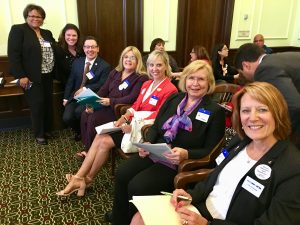N.J. Nurses Fight for Full Practice Authority To Increase Patient Access to Care
Looming Physician Shortage Threatens Statewide Health

Some of the New Jersey nurses who came out to testify in support of the removal of joint protocol for advanced practice nurses. NJSNA President Kate Gillespie, RN, MBA, NE-BC, is on the far right.
TRENTON, N.J.—June 3, 2019— The New Jersey State Nurses Association (NJSNA) is advocating to increase consumer access to health care by eliminating the collaborating agreement between an advanced practice nurse (APN) and a physician. This agreement restricts an APN’s ability to practice to the full extent of their education and licensure, known as full practice authority.
Full practice authority allows APNs to evaluate patients, diagnose, order and interpret diagnostic tests, initiate and manage treatments and prescribe medications under the exclusive licensure authority of the state board of nursing without a collaborating agreement, or joint protocol, with a physician. The bill, S-1961, would remove the requirement of a collaborating agreement.
“We are bracing for New Jersey to experience a primary care physician shortage by 2030, due to an aging and increasingly insured population,” said Kate Gillespie, RN, MBA, NE-BC, NJSNA president. “New Jersey will need an additional 1,116 doctors to meet the demands for care, and APNs can fill those primary care needs safely, effectively and affordably.”
There are 9,799 active APNs in New Jersey, with most of them being nurse practitioners (NPs). NPs provide primary care and refer patients to specialists for more advanced treatment. New Jersey will need an additional 1,116 primary doctors, or 17 percent of the current workforce, to meet demands by 2030, according to the Robert Graham Center’s New Jersey: Protecting Primary Care Physician Workforce report.
“New Jersey is not a full practice authority state and the requirement for APNs to have a joint protocol is restricting access to care,” said Gillespie “If an APN loses their physician collaborator, they are no longer allowed to prescribe medications or medical devices, which limits their ability to adequately care for their patients. Finding a collaborator can be incredibly difficult and often has a costly price tag. This is another barrier to the APN providing care. APNs practice throughout the state and are especially critical in rural and urban areas where there is a shortage of physicians.”
By statutory law in New Jersey, the collaborating agreement requires the APN and the physician to review one patient case per year. There is no supervisory requirement by the physician; in fact, the physician doesn’t even need to be in the same town or county as the APN or be in the same specialty.
APNs are trained at the graduate level to evaluate patients, diagnose illness, and prescribe medication to patients, focusing on the well-being of the whole person, not just a disease. APNs include NPs, clinical nurse specialists (CNSs) and APNs-anesthesia; they are licensed and regulated by the New Jersey Board of Nursing. Approximately two-thirds of Garden State APNs are NPs; the largest number of CNSs provide mental health services and practice psychiatry. Nurse midwives are licensed and regulated by the New Jersey Board of Medical Examiners.
APNs were legally recognized as healthcare professionals by the New Jersey Legislature in 1992 and, two years later, titling regulations for NPs and CNSs were adopted by the Board of Nursing. APNs did not have prescriptive authority. Standards for joint protocols, which gave APNs prescriptive authority, were not enacted until 1999.
The bill has support from AARP, New Jersey Health Plan and the New Jersey Nurse Anesthetists Association, among others. It is co-sponsored by Sens. Joseph Vitale (D-19), Loretta Weinberg (D-37), Fred Madden (D-4) and Rep. Patrick Deignan (D-18).
###
About NJSNA
NJSNA, which was established in 1901, is a constituent member of the American Nurses Association. The New Jersey State Nurses Association (NJSNA) represents the interests of 110,000 registered nurses and advanced practice nurses as an advocate for the nursing profession. NJSNA’s lobbying arm continues to protect the nursing profession through legislative victories. Its nonprofit foundation, Institute for Nursing, helps nurses further their careers by providing continuing education, scholarships and research grants in addition to invaluable networking opportunities. For more information, nurses can visit njsna.org or contact NJSNA at njsna@njsna.org or call (609) 883-5335.



